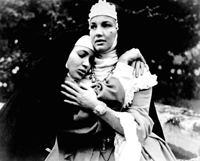FILM NOTES
FILM NOTES INDEX
NYS WRITERS INSTITUTE
HOME PAGE

(French, 1965, 130 minutes, color, 35mm, in French w/English subtitles)
Directed by Jacques Rivette
Cast:
Anna Karina. . . . . . . . . . Suzanne
Francine Bergé . . . . . . . . . . Soeur Sainte-Christine
Liselotte Pulver . . . . . . . . . . Madame de Chelles
Micheline Presle . . . . . . . . . . Madame de Moni
The
following film notes were prepared for the New York State Writers
Institute by Kevin Jack Hagopian, Senior Lecturer in Media Studies
at Pennsylvania State University:
It is a dark, forbidding place, with long hallways disappearing into the gloom, and stairways with sudden turnings that lead nowhere, and rooms with a dozen corners. It is the "House of Fiction," the name Jacques Rivette has coined for his uncompromising cinematic style. With the late-career success of 2000’s VA SAVOIR, a mass audience has once again been invited into the House of Fiction, its first visit since 1966’s popular LA RELIGIEUSE.
Francois Truffaut once said that the French New Wave was "thanks to Rivette." At once expansive and provocative, the remark perfectly captures the qualities in Rivette, which made him a much-respected figure to his younger colleagues in the New Wave in the late 1950s. Like Truffaut and Jean-Luc Godard, he wrote for the influential film journal Cahiers du Cinema, and it was widely assumed that it would be Rivette who would first make the move from critic to director. In fact, Rivette began shooting his debut film, PARIS NOUS APPARTIENT, before any of his New Wave colleagues. The film initiated Rivette’s subtle, monolithic style, with its over 30 characters, its multitude of settings, and its largely improvised script. Production on the film wandered as Rivette and his collaborators continued revising their ideas, and distributors were chary of releasing such an ambiguous work on an unsuspecting public. It took the international success of Truffaut’s THE 400 BLOWS, Godard’s BREATHLESS, and Alain Resnais’ HIROSHIMA, MON AMOUR to prepare the ground for Rivette. The films of Jacques Rivette were, and remain, unremitting in their demands on an audience’s intelligence.
From 1966 to 1972, Rivette enjoyed his greatest success. His films were imbued with the questioning spirit of Paris ’68, and his films became celebrated even among those who were put off by his distant, even opaque approach. With the release of 1966’s LE RELIGIEUSE, Rivette came perfectly into synch with the tumult of his times. The film is the story of "Suzanne Simonin," (Anna Karina), a young woman of the eighteenth century who is trapped in the rigid order of convent society. At war with her Mother Superior, played with calculating cruelty by Micheline Presle, Suzanne continues her campaign of self-assertion against the psychological bondage of the convent. It is a conflict that eventually becomes a mortal one, exploding across boundaries of sexuality and power.
LE RELIGIEUSE was seen by many as an allegory for the intransigence of power of Gaullist France. This impression was strengthened when the film was banned in France for two years because of its anti-Catholicism. When, after two years, the film finally made it into general release, it was received in triumph as an official selection at the Cannes Film Festival—a triumph that was repeated more than three decades later by VA SAVOIR. With LA RELIGIEUSE, Rivette offered an understanding of the mechanisms of power, and their brutalizing response to nonconformity that still inspires audiences, who find Rivette’s thickly textured narrative a perfect setting for exploring the complexities of authoritarian society. And Rivette’s heroine, Suzanne, is in the vanguard of a politicized screen feminism. LA RELIGIEUSE is a document of its very turbulent days, but it is also a record of a moment when an entire society saw the world through the eyes of a director whose vision has remained focused and clear over the long years.
— Kevin Hagopian, Penn State University
For additional information, contact the Writers Institute at 518-442-5620 or online at https://www.albany.edu/writers-inst.
